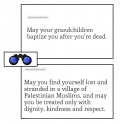Yiddish humor, US Presidential Election
[ by Charles Cameron — Jewish Democrats suggest humorous barbs for Jewish Republicans to digest ]
.
As those who follow my strand of posts her on Zenpundit know by now, I’m not a great one for taking sides: I imagine very few bridge builders are, and my real interest is in building bridges.
I am also, in general, interested in the ephemeral signals that go on between and within opposing camps — because they’ll often portray a different side of things from what’s in the official pronouncements.
What I’m offering here, then, is a fleeting glimpse into some Jewish humor from the Democratic side of things:
.
— two “curses” from the from the Yiddish Curses for Republican Jews website.
As wry humor, I’m okay with these. As embittered humor, not so much.
And I don’t know the people who posted these “curses” — though I’m reasonably sure they didn’t intend them as actual, may G*d do this to you and I mean it, curses.
Frankly, I’m interested in the religious content.
**
I’m interested in the jokes.
I’m interested in the leaflets, the comments in the comment sections of websites — and in the winks, the nudges and the nods.
I’m interested in the differences between “in-house” and “external” explanations of things, what the differences may actually mean, and what they may get interpreted to mean. I’m interested in the asides, the sneers and smears, the jokes, the ambiguous threats, the real hatreds, the moments of reflection, the metanoias, changes of heart, repentances.
At times, the materials I run across are threatening, at times witty or droll, at times insightful, and at times completely unhinged from reality, but they usually have something to teach us about undercurrents — about the variousness of human thoughts and feelings.
We humans are a strange lot, each one of us so singular that we have a hard time getting our heads around the differences between us — differences that can make all the difference between peace and war, life and death.
**
I’m not going to explain the jokes, but I am going to take just a quick look at their religious content.
One of the qualities that is, IMO, most likeable about Jewish culture is that it delights in self-mockery. The New York Times journalist Michelle Goldberg tweeted a Jewish joke yesterday, to which I responded with a quote from Martin Luther:
Now I don’t know about Michelle, but I didn’t intend my quote from Luther — “sin boldly” — as representing either my personal advice to the world at large, or Luther’s, except perhaps in a very limited sense such as the one Dietrich Bonhoeffer offered as his explanation of Luther’s meaning.
Bonhoeffer’s question is the obvious one:
Is this the proclamation of cheap grace, naked and unashamed, the carte blanche for sin, the end of all discipleship? Is this a blasphemous encouragement to sin boldly and rely on grace? Is there a more diabolical abuse of grace than to sin and rely on the grace which God has given?
And his response?
Page 1 of 3 | Next page

